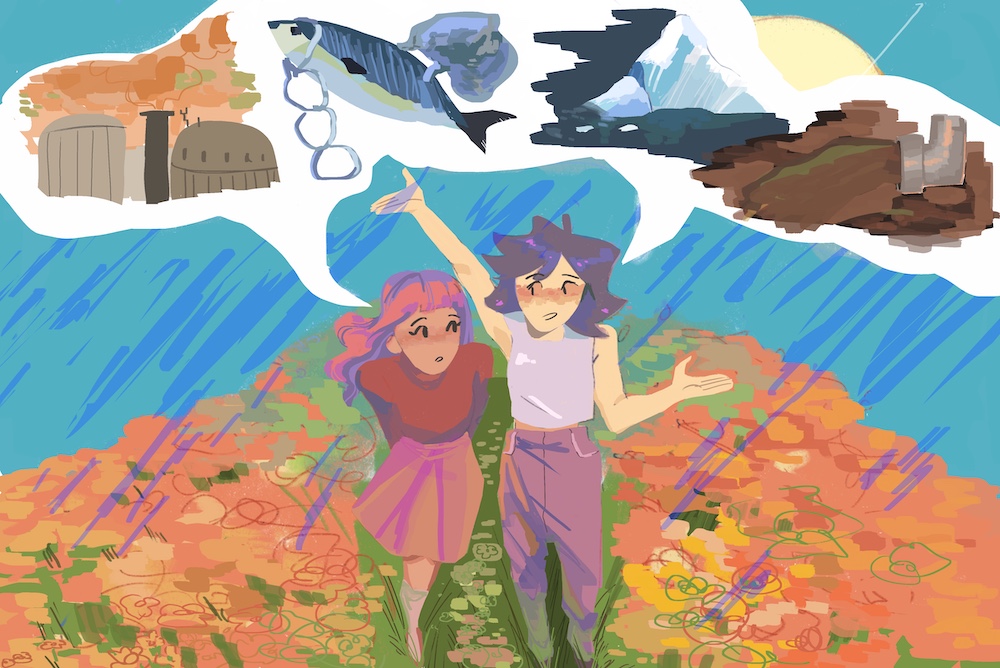During the many occasions on which life throws you together with people you don’t know very well, chances are, you’ve talked about the weather: “It’s so nice out!” or “I heard it’s going to rain this week.” Chatter like this seems to be the epitome of small talk, especially in comparison to the “big questions” born from deeper intimacy: questions of politics, identity and “why are we here, really?”
But unlike pop culture or politics, the weather is something that every individual has in common. It’s so easy to instantly fold a stranger into a conversation or share a moment of awe with an acquaintance about the daily changes in our environments — the delight of waking up to unexpectedly cloudy skies, the deep tiredness that settles upon us from trudging about in the Southern California heat.
Maybe there’s a reason the weather is such an accessible topic. Streaming services and news sites personalize our content for us; we’re living through a loneliness epidemic, atomized from our neighbors. When so much of modern life dissipates the moment we close our computers, the state of our home, Planet Earth, is perhaps the only experience we all share.
Ancient people were much more vulnerable to the elements than we are. The rains heralded the harvest season; a storm could wipe out a village. And so they celebrated the weather, prayed about it, danced for it, lived it. We’re not so vulnerable anymore. Beyond just jackets and umbrellas, we have technologies that attempt to elevate our status on Earth from animals to masters. With a single click, mountains are moved and seas are parted for our package to arrive in two days. Sitting in a plane, sipping a soda and watching TV while cruising through the skies at 560 miles per hour, how can we possibly feel mortal?
In contrast, acknowledging the weather is acknowledging our capacity to be affected by the world. It gives me a moment to surrender to the unassailable fact that I am still an animal, and that the way I feel and dress and move through the world is still determined by simple realities like the warmth beating down on my skin, or the moist brown earth scuffing beneath me as I run.
Enjoying — or detesting — the weather is a purely sensory experience. Watching a river of light flood Stewie Beach each morning or listening to the wind rattling our doors, we don’t need to decide or analyze or do any of the higher functions that define a human being. All we have to do is live on this planet and passively allow its exquisite beauty to act upon us.
Early in September 2020, I, like many in California, woke up to orange skies and rains of ash. Driving to work at 7:30 a.m, I had to keep reminding myself it wasn’t dusk. It was an eerie experience to see the sky, which had once shone a cerulean blue and nourished our streets with rain, choked in noxious smoke. People at my job could not stop talking about it. We spent whole hours staring languidly at the sky, feeling the ash dusting our fingers. We thought about the people whose homes were being threatened by the flames, the forests being devastated by them. As the weather becomes more extreme, talking about it isn’t just idle chatter but an urgent conversation. We need to keep talking about our planet, in small ways and large, to ensure that we don’t accept or normalize climate change but commit ourselves to resisting it.
So please, keep talking about the weather. As you walk, as you eat, as you pray, as you study, don’t lose sight of nature’s perfection. As I go about my day, it’s really easy for my attention to slip away from my bountiful surroundings and solely into my phone, my schoolwork, my brain and its workings. But even a simple redirection of awareness — “Woah, look at those clouds!” — goes a long way. I don’t know yet what my role will be in protecting Planet Earth, but I know that it will start with simply loving her.
On the first morning of fall break, I woke up to the squawking of parrots and the chatter of passersby outside my dorm. I Ieft to go to the Marketplace, sharing the silent walk with strangers and classmates, all of us bundled up and enjoying — or at least, experiencing — the surprising chill in the air. We walked past the trees, alive with the hum of the bees; we walked past the hibiscuses, each flowering in accord with its own divine internal logic. We walked apart yet together, not as observers or enjoyers of nature but as bodies planted within it.
![]()































